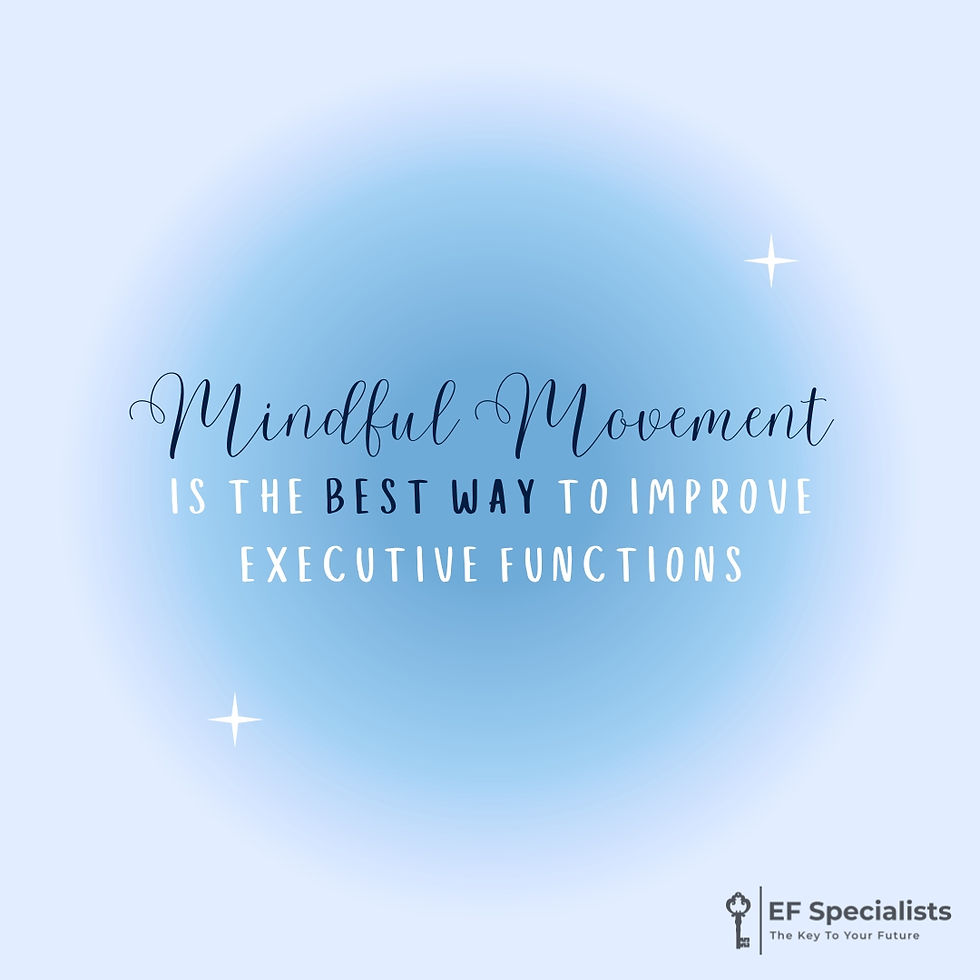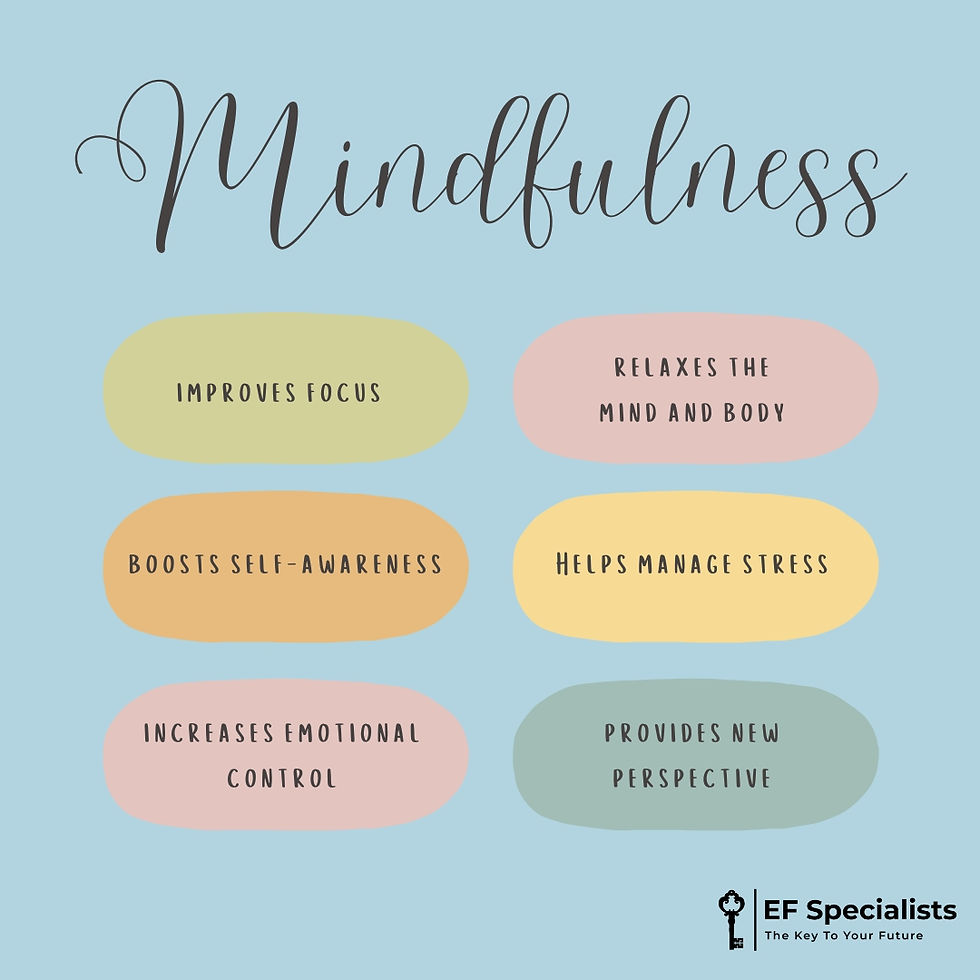What does peer-reviewed research tell us about executive function skills? (2025)
- Sean McCormick

- Feb 11, 2025
- 6 min read
Thank you to our sponsors who keep this newsletter free to the reader:
Learn how to become an Executive Function Coach by downloading our comprehensive framework to start your coaching business. Learn more
While there is a lot of talk about how important executive function skills are, what does the research tell us?
In this article, I will look at the most cited research articles on executive functioning to identify key themes and patterns.

The Holy Grail of all studies done on executive function skills is Dr. Adele Diamond's 2012 study, "Executive Functions," a systematic mega-review of executive function interventions.
This was one of is the first to review all the different ways that people have tried to improve EFs. Since then, Dr. Diamond has continued to publish more research on her website, the Developmental Cognitive Neuroscience Lab of Adele Diamond.
Combing through the research, the most important facts that emerge from research on executive functioning are the following:
Read below to see more details on each of these facts and the studies from which these groundbreaking truths emerge.

1. Stress impairs the executive functions
Though stress is inevitable in life, it is important to understand how it impacts executive function skills. ADHD symptoms may increase when stress is involved.
See our article about how to conquer stress and improve executive functions.
Even extremely mild social evaluative stress (worrying about what others might think of you or your performance) impairs the executive functions of most people.
Source: Shahab Zareyan, Haolu Zhang, Juelu Wang, Weihong Song, Elizabeth Hampson, David Abbott, Adele Diamond, First Demonstration of Double Dissociation between COMT-Met158 and COMT-Val158Cognitive Performance When Stressed and When Calmer, Cerebral Cortex, Volume 31, Issue 3, March 2021, Pages 1411–1426, https://doi.org/10.1093/cercor/bhaa276
2. Mindful movement practices are the BEST thing for executive functions
Mindfulness practices all share characteristics of quieting the mind and body which minimizes internal and external distractions so that one stays present and attentive to individual senses and thoughts.
In an extensive study comparing the benefits of practices that impact executive function, mindfulness practices were shown to increase executive function.
We found that mindful movement practices, e.g., taekwondo & t’ai chi, show the best results for improving EFs.
Source: Diamond, A. & Ling, D. S. (2019). Review of the evidence on, and fundamental questions about, efforts to improve executive functions, including working memory. In J. Novick, M.F. Bunting, M.R. Dougherty & R. W. Engle (Eds.), Cognitive and working memory training: Perspectives from psychology, neuroscience, and human development, (pp.143-431). New York, NY: Oxford University Press.


3. Computerized cognitive training programs show limited evidence of helping develop executive function skills (even though they claim lots of benefits)
Cognitive training programs were always outperformed by mindful movement and school programs promoting executive function skills, with computerized cognitive training programs showing fewer results than non-computerized cognitive training.
Source: Diamond, A. & Ling, D. S. (2019). Review of the evidence on, and fundamental questions about, efforts to improve executive functions, including working memory. In J. Novick, M.F. Bunting, M.R. Dougherty & R. W. Engle (Eds.), Cognitive and working memory training: Perspectives from psychology, neuroscience, and human development, (pp.143-431). New York, NY: Oxford University Press.
4. ADHD is the single greatest negative impactor on school achievement
John Hattie's ground-breaking study “Visible Learning," ranked 138 influences that are related to learning outcomes from very positive effects to very negative effects.
The average effect, across all the studies he's analyzed, was 0.4. standard deviations. This average also happens to translate — roughly — to the amount of progress a student can be expected to make in one year of school.
In his study, John Hattie found that ADHD has a -.90 effect size.
This means for students with ADHD is that they can expect to lag more than two years behind their neurotypical peers!
John Hattie updated his list of 138 effects to 150 effects in Visible Learning for Teachers (2011), and more recently to a list of 195 effects in The Applicability of Visible Learning to Higher Education (2015).
His research is now based on nearly 1200 meta-analyses – up from 800 when Visible Learning came out in 2009.

Source 2: https://www.npr.org/sections/ed/2015/08/13/430050765/five-big-ideas-that-don-t-work-in-education
5. Executive function skills (especially working memory) predict academic success
For the subjects of language and mathematics, the results of the random effects model were similar and slightly higher for mathematics (r = 0.350; r = 0.365). Thus, the theory that executive functions have greater influence on mathematical performance is supported, especially in aspects such as coding, organization, and the immediate retrieval of information.
Source: Cortés Pascual A, Moyano Muñoz N and Quílez Robres A (2019) The Relationship Between Executive Functions and Academic Performance in Primary Education: Review and Meta-Analysis. Front. Psychol. 10:1582. doi: 10.3389/fpsyg.2019.01582
6. Better executive function skills lead to improved quality of life
Improvements in executive function correlate with enhanced performance and functioning and health-related quality of life: evidence from 2 large, double-blind, randomized, placebo-controlled trials in ADHD
Source: Brown TE, Landgraf JM. Improvements in executive function correlate with enhanced performance and functioning and health-related quality of life: evidence from 2 large, double-blind, randomized, placebo-controlled trials in ADHD. Postgrad Med. 2010 Sep;122(5):42-51. doi: 10.3810/pgm.2010.09.2200. PMID: 20861587.

7. EFs are more important for school readiness than are IQ or entry-level reading or math
...in one hundred and forty-one 3- to 5-year-old children from low-income homes...Results indicated that the various aspects of child self-regulation accounted for unique variance in the academic outcomes independent of general intelligence and that the inhibitory control aspect of executive function was a prominent correlate of both early math and reading ability.
Findings suggest that curricula designed to improve self-regulation skills as well as enhance early academic abilities may be most effective in helping children succeed in school.
Source: Blair, C., & Razza, R. P. (2007). Relating effortful control, executive function, and false belief understanding to emerging math and literacy ability in kindergarten. Child development, 78(2), 647-663.
Executive function coaching can help:
Current research clearly shows the importance of executive function skills on academic success and quality of life. If you are struggling with ADHD, school challenges due to executive function deficits can be significant.
In addition to combating stress and adopting a mindfulness practice based in movement, an executive function coach can help!
An Executive Functioning coach can provide personalized guidance, support and practical solutions tailored specifically to your individual needs - all designed to help propel you forward in education and life.
From developing better self-regulation tools, to identifying effective study habits — working with an executive function coach can make all the difference!
See our article to learn more in the definitive guide to executive function coaching and visit our website to book a consultation https://www.efspecialists.com.
Summary
Research shows that executive function skills are very important for quality of life and academic success. Scientific evidence suggests that stress and ADHD have the biggest effect on executive function skills. To help combat this, practice mindful movement, which outcompetes computer-based cognitive training programs, to help stay present and improve executive functions. In addition to mindful movement, an executive functioning coach proves very beneficial because of personalized support tailoring to an individual's specific needs.
Just in case you needed more evidence to trust the source of most of this research (Dr. Adele Diamond), check out this clip of Dr. Adele Diamond teaching the Dalai Lama about executive function skills:
P.S. These are skills that executive function coaches work on with their students. If you want to try working on them with your students, consider joining hundreds of other educators and parents who have completed my Semester Success Blueprint Course. In less than 2 hours, this comprehensive course will teach you and your student the system I developed to help hundreds of students learn how to manage school effectively and raise their self-awareness and engagement with school.
About Me

Hey! I'm Sean 👋
I'm a former public school special education teacher who realized that executive function skills are more important than knowing when George Washington crossed the Potomac.
Since then, I've made it my mission to teach anyone who will listen about how to develop these key life skills.
In 2020, I founded Executive Function Specialists to ensure all students with ADHD and Autism have access to high-quality online executive function coaching services. We offer online EF coaching and courses to help students and families.
Realizing I could only reach so many people through coaching, in 2021 I started the Executive Function Coaching Academy which trains schools, educators, and individuals to learn the key strategies to improve executive function skills for students.
In 2023, I co-founded of UpSkill Specialists, to provide neurodivergent adults with high-quality executive function coaching services.
When not pursuing my passions through work, I love spending time with my family, getting exercise, and growing my brain through reading. You can connect with me on LinkedIn.